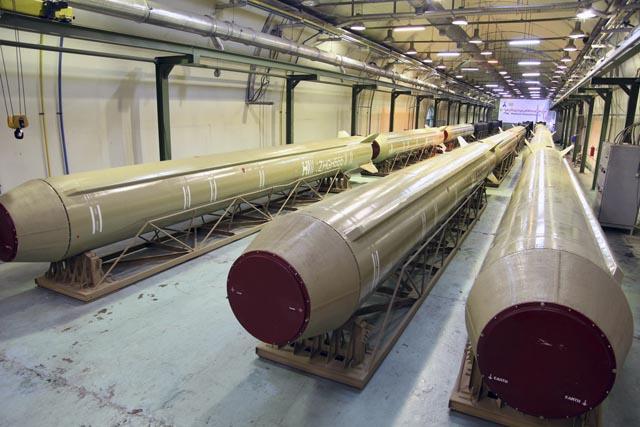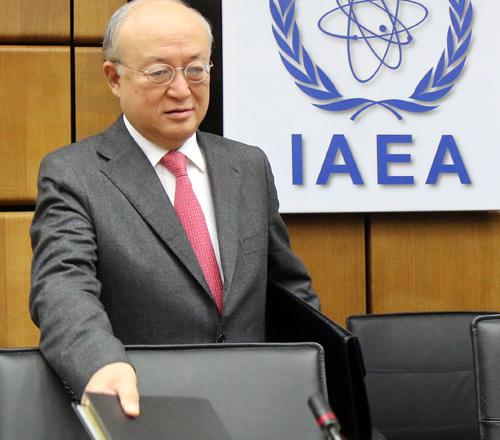You are here
West presses Iran to address suspected atomic bomb research
By Reuters - Mar 05,2014 - Last updated at Mar 05,2014

VIENNA — Western powers pressed Iran on Wednesday to tackle suspicions that it may have worked on designing an atomic bomb and the United States said the issue would be central to the success of talks on a final settlement over Tehran’s nuclear programme.
At a board meeting of the International Atomic Energy Agency, Washington and the European Union underlined their support for the UN watchdog’s efforts to investigate long-running allegations of possible nuclear arms research by Iran.
The IAEA inquiry is separate from but complementary to higher-level political talks between Iran and six world powers aimed at a deal on the overall scope of Tehran’s nuclear energy programme to ensure it cannot be diverted into bombmaking.
In potentially a significant advance for the IAEA’s probe, Tehran agreed last month to address one of many topics the UN agency wants answers on — the development of fast-acting detonators with both military and civilian applications.
But while this was welcomed by Western officials at the closed-door session of the IAEA’s 35-nation governing board in Vienna, they made clear the Islamic republic must do much more.
The US ambassador to the IAEA, Joseph Macmanus, said it remained critical for Iran to address substantively all international concerns about the so-called possible military dimensions (PMD) of the country’s nuclear programme.
A “satisfactory resolution of PMD issues will be critical to any long-term comprehensive solution to the Iranian nuclear issue”, Macmanus said, according to a copy of his statement.
He later told reporters: “It is a central element to this negotiation, and all parties recognise that.”
The 28-nation European Union voiced a similar line in its statement: “We urge Iran to cooperate fully with the agency regarding PMD issues, and to provide the agency with access to all people, documents and sites requested.”
Iran denies Western allegations that it is seeking to develop the capability to make atomic arms, saying its nuclear programme is a peaceful project to produce electricity.
“In our view, those claims are baseless and we haven’t received any substantiated document in that regard,” Iranian Ambassador Reza Najafi told a news conference. “However, we continue to work with the agency trying to remove ambiguities.”
Also in Vienna on Wednesday, experts from Iran and the powers — the United States, Russia, France, Britain, Germany and Britain — began a meeting to prepare for the next round of political-level talks on March 17 in the Austrian capital.
Diplomats said Russia took part in the discussions, suggesting no apparent immediate fallout in the Iran negotiations because of the crisis over Ukraine.
“The overriding commitment is one of working together to resolve the Iran nuclear programme and there are many other issues in the world that will continue to cause us to have disagreements and debates and sometimes to find ourselves in opposition to one another,” Macmanus said when asked whether tensions over Ukraine could disrupt the Iran talks.
A senior Iranian official said: “Iran would surely stay out of this dispute [over Ukraine]. A neutral position of Iran would be enough to prevent harming the upcoming talks.”
Iran and the powers are aiming to build on a breakthrough deal reached late last year in Geneva under which Tehran agreed to curb parts of its nuclear programme in exchange for some easing of sanctions that are battering its economy.
The six-month agreement focused mainly on preventing Tehran obtaining nuclear fissile material to assemble a future bomb, rather than on whether Iran sought to develop nuclear weapons technology in the past, which the IAEA is investigating.
Western diplomats and nuclear experts say the IAEA needs to carry out its inquiry to establish what happened and to be able to provide assurances that any “weaponisation” work — expertise to turn fissile material into a functioning bomb — has ceased.
But it is unclear to what extent it will form part of any long-term accord between Iran and the powers — which unlike the IAEA can lift crippling sanctions on the major oil producer and, therefore, have more leverage in dealing with Tehran.
Israel, believed to be the Middle East’s only nuclear-armed power, has branded the Geneva deal an “historic mistake” as it did not require Iran to dismantle its uranium enrichment sites.
Israel’s envoy to the IAEA attacked what she described “as the new Iranian tactic, to present a pretense of cooperation, while limiting its agreement to the more marginal issues”.
“This proves that Iran has a reason to continue and hide its clandestine activities related to the development of a nuclear weapon,” Israeli Ambassador Merav Zafary-Odiz said.
Iran says it is Israel’s assumed atomic arsenal that threatens peace and stability in the volatile Middle East.
Related Articles
Iran has agreed to address some of the many long-held allegations that it conducted research into making nuclear weapons before 2003 and possibly since, the UN atomic watchdog said Wednesday.
Iran is reducing its most proliferation-prone nuclear stockpile as required by its landmark deal with world powers but much work remains to be done to resolve all concerns about Tehran’s activities, the UN atomic watchdog chief said on Monday.
Talks between the UN nuclear watchdog and Iran this week appear not to have substantively advanced an investigation into suspected atomic bomb research by Tehran, potentially dimming chances for a broader deal between the Iranians and big powers.












